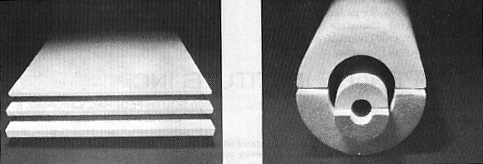HIGH TEMPERATURE INSULATION AND FORMED SHAPES
WHAT IS PERLITE
Perlite is not a trade name but a generic term for naturally occurring siliceous volcanic rock. The distinguishing feature which sets perlite apart from other volcanic glasses is that when heated to a suitable point in its softening range, it expands four to twenty times its original volume.
This expansion is due to the presence of two to six percent combined water in the crude perlite rock. When quickly heated to above 1600° F (8700 C) the crude rock pops in a manner similar to popcorn as the combined water vaporizes and creates countless tiny bubbles in the heat softened glassy particles. It is these tiny glass-sealed bubbles which account for the excellent insulating properties and lightweight of expanded perlite.
Expanded perlite can be manufactured to weigh from 2 lb/ft3 (32 kg/m3) to 15 lb/ft3 (240 kg/m3) making it especially suitable for use in insulation applications. Perlite is used in the manufacture of lightweight perlite concrete, insulating board, insulating plasters, cryogenic insulation, masonry wall insulation and as underfloor insulation.

PERLITE/SILICATE COMPOSITES
Expanded perlite granules can be bonded to form rigid shapes for a very wide range of applications. The most suitable binder for many purposes is a liquid sodium silicate similar to traditional "waterglass." The liquid sodium silicates are solutions of water soluable glasses manufactured from varied proportions of Na2C03 and SiO2, providing a wide range of chemical and physical properties.
Sodium silicates are widely used as high temperature adhesives and binders due to the following properties:
- Low Cost
- Inorganic
- Easy to Handle
- Rapid Controlled Set
- High Strength
- Insolubility (when aired)
- Chemical Stability
Silicate-bonded perlite makes an insulation material which is completely non-flammable, the refractory nature of the bond being a major advantage.
Potassium silicate is sometimes preferred for applications where heat insulation and fire resistance are the main objectives. This material has a slightly higher softening point than its sodium counterpart.
Sodium silicate is widely used as a binder for molding sand in foundries. The technology for perlite/sodium silicate composite manufacture is based largely on this foundry industry experience.
| TYPICAL PROPERTIES OF PERLITE/SODIUM SILICATE COMPOSITES |
|
| Thermal Conductivity (ASTM C-177, C-325) .... at mean temp. 2500F (1200C) | 0.40 BTU.in/h.ft2.F0 (0.058 W/m.K) |
| Thermal Conductivity (ASTM C-177, C-325) .... at mean temp. 4500F (2300C) | 0.56 BTU.in/h.ft2.F0 (0.081 W/m.K) |
| Thermal Conductivity (ASTM C-177, C-325) .... at mean temp. 6600F (3500C) | 0.65 BTU.in/h.ft2.F0 (0.094 W/m.K) |
| Thermal Limit (ASTM C-447) | 12000F (6500C) |
| Density(ASTM C-447) | 11-16 lb/ft3 (180-260 kg/m3) |
| Modulus of Rupture (ASTM C-203,C-446) .....minimum | 50-60 lbs/in2 (0.34-0.41 N/mm2 |
| Compressive Strength(ASTM C-165) .....minimum | 75-88 lbs/in2 (0.52-0.61 N/mm2 |
| Linear Shrinkage (ASTM C-356) | less than 2% at 1200 0 |
| Water Absorpton | under 10% by volume after 24 hours |
PERLITE/SODIUM SILICATE TECHNOLOGY
A wide range of formulations of perlite, sodium silicate solution and setting agent can be used, together with additives to control setting of the mix. General guidelines are given as a starting point.
SOLUBLE SILICATE GRADES
The choice of grade of sodium silicate solution depends on the application and setting process being used. Generally, a higher silicate to alkali ratio gives faster setting while lower ratios and higher solids contents give greater strength in the finished product.
SETTING AGENTS
- Gas---Carbon dioxide (usually blown through the molded shape)
- Liquids---Glycerol Diacetate plus either
- Glycerol Triacetate or
- Ethylene Glycol Diacetate
- Solids
- Solids Calcium silicates - e.g. Portland Cement
- Calcium Sulphate-e.g. gypsum
- Silicides-g.g. Ferrosilicon or Calcium Silicide
- Silicofluorides or fluorosilicates
- Ground metallurgical slab
- Heavy metal salts-e.g. carbonates or phosphates